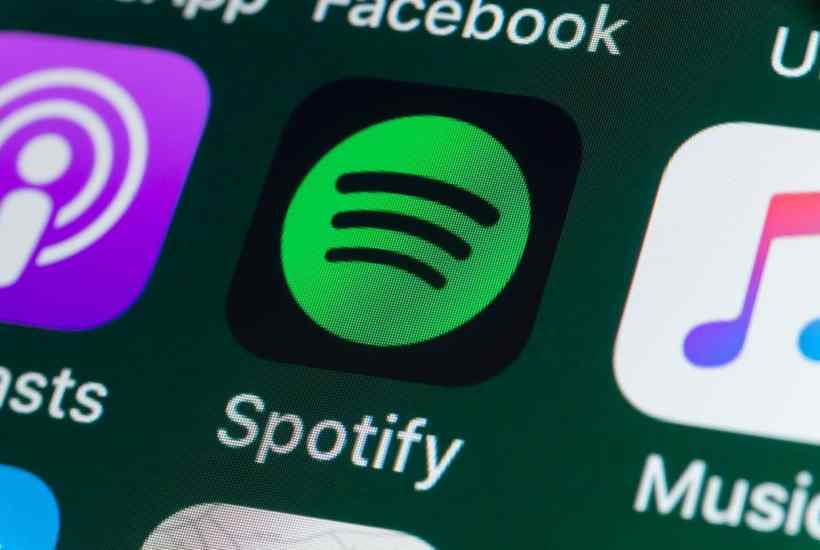When Neil Young issued his threat to Spotify – get rid of Joe Rogan’s podcast or remove my music from your platform – he was probably hoping a chorus of other musical artists would weigh in behind him. After all, Spotify paid a reported $100 million to Rogan for the exclusive rights to host his podcast and, given that each episode attracts 11 million listeners, it must be quite a money spinner for the music streaming service. I’m sure Young’s music does alright on Spotify, but from a purely commercial point of view it was a no-brainer.
Thankfully, only Joni Mitchell seems to have joined Young’s boycott so far, and that’s the most significant thing about this episode, not Spotify’s decision to side with Rogan. Some commentators are hailing Spotify for its principled stance, but its track record on free speech isn’t great. Plenty of controversial podcasters have been removed from the platform and when Rogan transferred his back catalogue to the service many of his more controversial episodes were not made available at the company’s insistence.
Young took the stance he did because he believes Rogan is ‘spreading fake information about vaccines’, according to a now deleted letter. This, he said, is ‘causing death’ by prompting some people not to get vaccinated or boosted. What appears to have pushed Young over the edge was Rogan’s decision to interview two prominent vaccine sceptics, Dr Robert Malone and Dr Peter McCullough. But this is an odd hill to die on. As Vinay Prasad, an Associate Professor of Epidemiology and Biostatistic, pointed out in a piece for UnHerd:
‘Rogan is not a scientist, and, like everyone else, he has his biases. But he is open-minded, sceptical, and his podcast is an important forum for debate and dialogue. It is not enough, moreover, to simply dismiss Malone and McCullough as conspiracy theorists. They are controversial and polarising figures, but they do have real credentials. Malone is a physician who has worked in molecular biology and drug development for decades, while McCullough was, until recently, an academic cardiologist and researcher.’
The argument that any and all vaccine sceptics – and anyone providing them with a platform – should be censored because otherwise people will die is not convincing.
For one thing, it presupposes that Malone and McCullough are flat out wrong about the Covid vaccines when, as Prasad points out, they are wrong about some things, right about others.
For instance, Malone was widely criticised for saying to Joe Rogan: ‘Think twice about giving these jabs to your kids.’ But that’s hardly ‘misinformation’ and some public health authorities have said they don’t recommend vaccinating young children, including, most recently, the Swedish Health Agency.
More importantly, even if you’re a vaccine enthusiast, as Neil Young clearly is, suppressing all criticism of the Covid vaccines is not going to persuade sceptics that the benefits outweigh the risks if you’re not a member of a vulnerable group and already have natural immunity on account of having had and recovered from Covid.
On the contrary, banning doctors like Malone and McCullough from the airwaves will end up entrenching scepticism, persuading the hesitant that there is important safety information about the vaccines that’s being withheld. In addition, if you ban vaccine sceptics from mainstream platforms like the Joe Rogan Experience, where their claims can be interrogated and debated, you don’t silence them altogether, but push them out to more obscure parts of the internet, where their so-called ‘misinformation’ is less likely to be challenged.
That was the argument made in a recent report by the Royal Society which concluded that the harms of removing misleading scientific content from social media platforms would outweigh the benefits. Outright bans, the report argued, could drive misinformation ‘to harder-to-address corners of the internet and exacerbate feelings of distrust in authorities’.
Or, as the US Supreme Court Justice Louis Brandeis said: ‘If there be time to expose through discussion, the falsehoods and fallacies, to avert the evil by the processes of education, the remedy to be applied is more speech, not enforced silence.’
This is one of the strongest arguments for free speech – sunlight is the best disinfectant – and Neil Young would do well to remember it next time he tries to censor speech he regards as dangerously misleading.
Got something to add? Join the discussion and comment below.
Get 10 issues for just $10
Subscribe to The Spectator Australia today for the next 10 magazine issues, plus full online access, for just $10.




















Comments
Don't miss out
Join the conversation with other Spectator Australia readers. Subscribe to leave a comment.
SUBSCRIBEAlready a subscriber? Log in